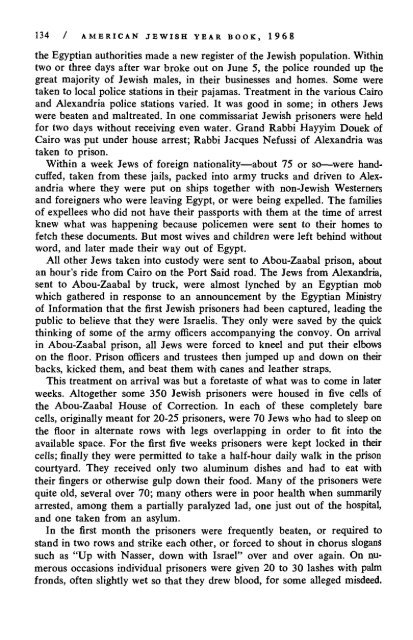1968_4_arabisraelwar
Create successful ePaper yourself
Turn your PDF publications into a flip-book with our unique Google optimized e-Paper software.
134 / AMERICAN JEWISH YEAR BOOK, <strong>1968</strong><br />
the Egyptian authorities made a new register of the Jewish population. Within<br />
two or three days after war broke out on June 5, the police rounded up the<br />
great majority of Jewish males, in their businesses and homes. Some were<br />
taken to local police stations in their pajamas. Treatment in the various Cairo<br />
and Alexandria police stations varied. It was good in some; in others Jews<br />
were beaten and maltreated. In one commissariat Jewish prisoners were held<br />
for two days without receiving even water. Grand Rabbi Hayyim Douek of<br />
Cairo was put under house arrest; Rabbi Jacques Nefussi of Alexandria was<br />
taken to prison.<br />
Within a week Jews of foreign nationality—about 75 or so—were handcuffed,<br />
taken from these jails, packed into army trucks and driven to Alexandria<br />
where they were put on ships together with non-Jewish Westerners<br />
and foreigners who were leaving Egypt, or were being expelled. The families<br />
of expellees who did not have their passports with them at the time of arrest<br />
knew what was happening because policemen were sent to their homes to<br />
fetch these documents. But most wives and children were left behind without<br />
word, and later made their way out of Egypt.<br />
All other Jews taken into custody were sent to Abou-Zaabal prison, about<br />
an hour's ride from Cairo on the Port Said road. The Jews from Alexandria,<br />
sent to Abou-Zaabal by truck, were almost lynched by an Egyptian mob<br />
which gathered in response to an announcement by the Egyptian Ministry<br />
of Information that the first Jewish prisoners had been captured, leading the<br />
public to believe that they were Israelis. They only were saved by the quick<br />
thinking of some of the army officers accompanying the convoy. On arrival<br />
in Abou-Zaabal prison, all Jews were forced to kneel and put their elbows<br />
on the floor. Prison officers and trustees then jumped up and down on their<br />
backs, kicked them, and beat them with canes and leather straps.<br />
This treatment on arrival was but a foretaste of what was to come in later<br />
weeks. Altogether some 350 Jewish prisoners were housed in five cells of<br />
the Abou-Zaabal House of Correction. In each of these completely bare<br />
cells, originally meant for 20-25 prisoners, were 70 Jews who had to sleep on<br />
the floor in alternate rows with legs overlapping in order to fit into the<br />
available space. For the first five weeks prisoners were kept locked in their<br />
cells; finally they were permitted to take a half-hour daily walk in the prison<br />
courtyard. They received only two aluminum dishes and had to eat with<br />
their fingers or otherwise gulp down their food. Many of the prisoners were<br />
quite old, several over 70; many others were in poor health when summarily<br />
arrested, among them a partially paralyzed lad, one just out of the hospital,<br />
and one taken from an asylum.<br />
In the first month the prisoners were frequently beaten, or required to<br />
stand in two rows and strike each other, or forced to shout in chorus slogans<br />
such as "Up with Nasser, down with Israel" over and over again. On numerous<br />
occasions individual prisoners were given 20 to 30 lashes with palm<br />
fronds, often slightly wet so that they drew blood, for some alleged misdeed.


